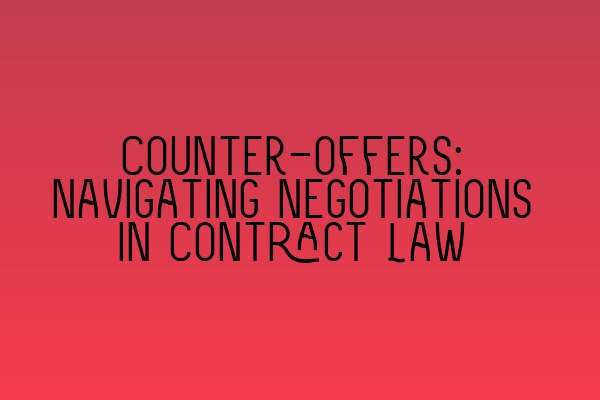Counter-offers: Navigating Negotiations in Contract Law
In the field of contract law, negotiations play a crucial role in reaching a legally binding agreement between parties. Throughout this process, counter-offers often come into play, adding an additional layer of complexity to the negotiation dynamics. Understanding how to navigate counter-offers is essential for solicitors and legal professionals to effectively represent their clients’ interests and ensure favorable outcomes.
What is a Counter-offer?
A counter-offer is a response to an initial offer made by one party, which introduces new or modified terms. When a counter-offer is made, the original offer is terminated, and the receiving party becomes the offeror. Essentially, a counter-offer acts as a rejection of the original offer and proposes a new offer with different terms and conditions.
Navigating Counter-offers: Key Considerations
1. Communication is Key: Clear and effective communication is crucial when navigating counter-offers. It is important to ensure that all parties have a thorough understanding of the terms proposed and the implications of accepting or rejecting the counter-offer. By maintaining open lines of communication, solicitors can facilitate productive negotiations that lead to mutually satisfactory agreements.
2. Analyze the Counter-offer: When presented with a counter-offer, it is essential to carefully analyze its terms and implications. This involves assessing the changes made, comparing them to the original offer, and considering their potential impact on the client’s objectives. Solicitors should carefully review the counter-offer and provide their clients with a comprehensive analysis to make informed decisions.
3. Balancing Client Interests: As legal professionals, it is crucial to advocate for our clients’ best interests during negotiations. This entails striking a balance between protecting our clients’ rights and desires while also recognizing the need for compromise to reach an agreement. By understanding our clients’ priorities and goals, we can guide them through negotiations with a strategic and client-centered approach.
4. Documentation and Contractual Clauses: Throughout the negotiation process, it is essential to maintain accurate documentation of all offers, counter-offers, and correspondence exchanged between parties. This documentation serves as evidence in the event of disputes or disagreements regarding the agreed-upon terms. Additionally, contractual clauses related to counter-offers should be carefully drafted to provide clarity on the acceptance or rejection of counter-offers and their effect on the negotiation process.
5. Legal Expertise and Advice: Navigating counter-offers can be complex and requires a comprehensive understanding of contract law principles. Seeking legal expertise and advice is highly recommended when negotiating contracts involving counter-offers. Consulting with a solicitor who specializes in contract law can provide valuable insights, minimize risk, and ensure that the negotiation process aligns with legal requirements.
Conclusion
In the realm of contract law, counter-offers are a common occurrence that requires careful navigation to reach mutually beneficial agreements. By prioritizing clear communication, thorough analysis, and a client-centered approach, solicitors can effectively advocate for their clients’ interests and ensure successful negotiations. Seeking legal expertise and maintaining detailed documentation also contribute to the overall strategic management of counter-offers. With these strategies in place, solicitors can confidently guide their clients through the negotiation process and achieve favorable outcomes.
For further resources and information on the SQE exams, practice exams, preparation courses, and important exam dates, please refer to the related articles below:
– SQE 1 Practice Exam Questions:
SQE 1 Practice Exam Questions
– SQE 1 Practice Mocks FLK1 FLK2:
SQE 1 Practice Mocks FLK1 FLK2
– SQE 2 Preparation Courses:
SQE 2 Preparation Courses
– SQE 1 Preparation Courses:
SQE 1 Preparation Courses
– SRA SQE Exam Dates:
SRA SQE Exam Dates
